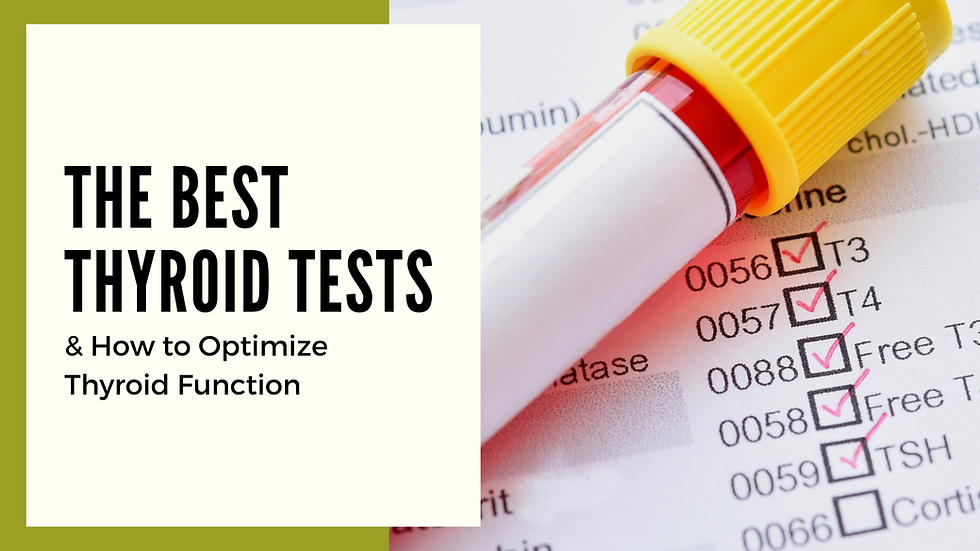The Best Thyroid Tests & How to Optimize Thyroid Function
- Linda Marquez Goodine
- Nov 28, 2017
- 4 min read
Updated: Jun 14, 2021

Testing
An assessment of symptoms is only a small piece of the puzzle when decoding the thyroid mystery. Why? Because although you can have all 300 symptoms on the checklist, it could signify any other health condition not necessarily related to the thyroid. Therefore, it is important to support an assessment with the proper labs directly related to affecting thyroid function. And what labs would that be, you might ask?
To begin, you might want to find a qualified health professional who is experienced in testing and interpretation. Yes, all doctors can read labs, well, anyone can read labs for that matter. However, a good practitioner will not only know how to read labs, but evaluate and determine if the ranges are within functional values. Functional values are important because although a lab marker falls within the lab ranges, it is not an indication that your results suggest perfect health. And because lab ranges are based on averages for a general population that does not necessarily represent you.
So what labs are most beneficial in determining if you have a thyroid dysfunction?
Thyroid Basics:
TSH
Free T3 and Free T4
Reverse T3
TPO Antibodies
TG Antibodies
Blood Sugar Analysis:
Fasting glucose
HgA1C
Triglycerides
Cholesterol
LDL
HDL
Iron:
Serum iron
TIBC
Transferrin
Ferritin
Vitamin D
Vitamin B12 and B6
Complete Blood Count
Comprehensive Metabolic Panel
Hormone Testing (saliva)
Intestinal Health
Lengthy list, right? Yet, as mentioned before, the thyroid gland significantly impacts many other functions in the body. Therefore, because the thyroid does not work alone, it is important to consider what other functions are being affected or are affecting balance as it is necessary to ensure optimal health and address the dysfunction appropriately.
You might ask, well, all the blood markers make sense to request, but why intestinal health?
The answer…because when the thyroid is not working properly, many bodily functions will either overwork or become sluggish, especially the digestive system. Often times, when a person begins to experience digestive issues such as constant diarrhea or constipation, they assume that their problem is digestive. They go see a gastroenterologist, who then prescribes medication to relieve the symptoms but does not consider the affecting factor and does not realize that further damage can be caused to the gut, while the underlying issues remains unsolved.
Therefore, no test is too insignificant nor useless when it comes to collecting all the pieces of the puzzle.
And after testing…treatment!
How To Optimize Thyroid Function
Wouldn’t it be great if all you had to do was take a magical pill and all the issues and symptoms would just float away? However, reality is that treatment for thyroid disease is not solely based on taking a daily pill and waiting for it to work. Yes, some people can benefit and help improve thyroid function with the use of medication. Yet, that is only a fraction of what the thyroid really needs.
Because each person’s experience and situation is unique, a healing protocol should be created individually. There is no one-size-fits-all plan out there that will provide immediate and effective results.
The Internet abundantly provides many protocols and diets specifically for thyroid health. Nevertheless, many of the protocols and diets out there can serve as mere suggestions which should be addressed with a qualified provider and under supervision as he or she can help modify the protocol to be of best of the individual’s needs.
Meanwhile, what can you do to help yourself?
Improve your nutrition. The thyroid loves foods that contain key nutrients such as iodine, zinc, omega-3 fats, and selenium to name a few. Eat as many nutrient dense foods as you can such as organ meats, colorful organic fruits and vegetables, sea vegetables, seeds, organic meats, and wild caught fish to name a few.
Reduce stress levels. Increased stress leads to overworked adrenals, cortisol spikes that can have a negative impact on thyroid function and creating hormonal imbalance. Find a stress relieving activity such as meditation, yoga, even reading a good book.
Exercise regularly. Find a good exercise program that not only keeps you engaged, but keeps you active for at least 30 minutes a day. It’s always fun to also add a workout buddy.
Supplement when needed. If for some reason you are not receiving enough nutrients through food, supplementation is a good option as it can help maintain nutrient levels while addressing any underlying issues.
Use probiotics. Probiotics not only help with healing the gut, they also help boost the immune system, and can aid in controlling the appetite.
Love on your liver! Many people do not know that the liver plays an integral part in good thyroid health. The liver is the filter; the cleaning machine. It is there that 60% of the thyroid hormone is converted from T4 to T3 and also reduces the excess T3 hormone to avoid toxicity in the body. Therefore, by easing the work of the liver (reduce environmental toxins, increase water intake, add more veggies and fruits to your diet, sweating), you are more likely to improve proper hormone production and distribution to the other parts of the body.
The Key Takeaway
The thyroid is more than just that little butterfly-shaped gland well hidden in the neck. It is an MVP of the body because without it, rest assured there will be imbalance. Therefore, at the onset of symptoms, it is vital that an individual seek the help of a good health professional who can request the most useful thyroid labs, do an extensive health assessment, and implement a unique and modified protocol that best suits the individual’s needs. Want to learn more? Here’s how. Schedule your complimentary phone consultation.
References:
https://hashimotoshealing.com/hashimotos-lab-tests/
https://draxe.com/hypothyroidism-diet-natural-treatment/
http://www.ejinme.com/article/S0953-6205(15)00243-5/fulltext
https://hashimotoshealing.com/hashimotos-the-liver-and-the-thyroid-an-important-relationship/
http://drhyman.com/blog/2010/05/20/a-7-step-plan-to-boost-your-low-thyroid-and-metabolis/
https://draxe.com/nutrient-dense-foods/





























Comments